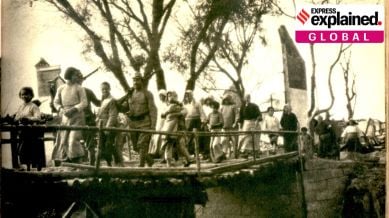Why South Korea’s apex court has asked two Japanese firms to compensate Korean wartime forced labourers
The issue of forced labour during Japan’s occupation of Korea in the early 20th century has been a major diplomatic flashpoint between the two countries.

This week, South Korea’s apex court ordered two major Japanese companies to financially compensate more wartime Korean workers who had been subjected to forced labor.
Mitsubishi Heavy Industries was asked to provide between 100 million and 150 million Korean won (approximately $76,700 and $115,000) in compensation to each of four plaintiffs, and Nippon Steel Corp. was asked to pay 100 million Korean won (approximately $76,700) to each of seven Korean plaintiffs.
The victims, who were forced to enlist in the Korean Women’s Volunteer Labor Corps and work at an aircraft plant in Nagoya in 1944, started the litigation in February 2014.
Japan’s colonial rule of Korea
Japan colonised the Korean Peninsula from 1910-1945. During World War II (1939-45), approximately 150,000 Koreans were forced to work in factories and mines in Japan. Moreover, thousands of Korean women were forced into sexual slavery in military brothels.
This dark past has remained a point of contention between Japan and South Korea, since the two formally established diplomatic relations in 1965. Over the years, South Korea has been persistent in trying to get Tokyo to financially compensate the victims, but that has not been straightforward.
One bone of contention is the 1965 Seoul-Tokyo treaty which normalised diplomatic relations between the two countries, and under which, Seoul received millions of dollars of economic aid from Tokyo. Japan has consistently claimed all wartime compensation has been settled under this treaty, a stance which previous South Korean governments, as well as survivors of Japan’s atrocities have disputed.
Moreover, several victims of forced labour and sexual slavery are dead, and those who survive are in their 90s. As of December 2023, the seven plaintiffs in the Nippon Steel case, and three of the four plaintiffs in the Mitsubishi Heavy Industries case have passed away.
Foreign policy and demands for compensation
Earlier this year, in an attempt to mend diplomatic ties with Tokyo, the South Korea government under President Yoon Suk Yeol announced a plan to compensate 15 Korean victims of Japanese wartime forced labour through a government-affiliated foundation, without compensation from Japanese companies. Instead, Korean companies which benefited from the 1965 normalisation treaty would provide payments on behalf of the Japanese firms responsible.
This proposal, however, was met with strong backlash from victims and their families, as well as from activists and civic groups, who demanded direct involvement by the companies who profited from this forced labour, and demanded a formal apology from Japan for its crimes.
Experts believe that the Yoon government’s attempts at improving diplomatic ties with Japan have come at the cost of giving due acknowledgement and respect to victims.
In October this year, Korean media reported that in 2022, the country’s foreign ministry had effectively stopped Yang Geum-deok, a victim of Japanese forced labour, from receiving the Moran Medal, South Korea’s second-highest Order of Civil Merit. A report by Yonhap said the foreign ministry had reportedly told the National Human Rights Commission of the need for “prior consultations among related authorities” before putting the recommendation up for a Cabinet review under the due procedure.
Japan rejects rulings, Korean victims want more
Neither the Japanese government, nor the companies involved have accepted the latest court rulings, and have insistied that all disputes have been resolved with the 1965 treaty.
Korean victims, however, want more, and are seeking to seize assets of the Japanese companies responsible for forced labour. Separate lawsuits to seize the Japanese firms’ local assets are now pending in South Korea’s Supreme Court.
In November this year, the Seoul High Court overturned a lower court’s rejection of a damages suit filed by victims of Japan’s wartime sexual slavery, and ordered Japan to compensate 200 million won (approximately US$153,863) to each of the 16 victims. Nine of the registered survivors of sexual slavery, known as ‘comfort women’ during the colonisation of the Korean Peninsula are still alive, in their 90s.
Thousands of women across the Asia-Pacific were forced to work as “comfort women” for Japan’s Imperial Army from the early 1930s till the end of World War II. However, this aspect of history remained hidden till a South Korean survivor came forward in the early 1990s, prompting others to speak more openly about their experiences and seek accountability.
Presently, in South Korea’s Supreme Court, seven other similar lawsuits are ongoing, of which rulings on three of the cases are scheduled for December 28 this year.